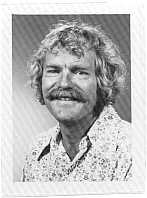 I'm
Eric Larson, married with two children, a toy poodle, and two cats, and
presently living in a sky-blue colored, Victorian type house in Olympia,
near the State Capi- tol. I was raised in San Mateo, California of a Swedish
immigrant family and went through the public schools there. At age twenty
I was inducted into the Air Force, spending time in Spokane and Albuquerque,
and after being discharged completed my B. A. at San Jose State. I taught
high school in San Jose and Lake Tahoe for four years (typing, mechanical
drawing, World History, among other related subjects) before deciding to
go back to graduate school at the University of Oregon. During this interim
I married my first wife, got divorced after two years, and am now with
my present wife, Pat, who has an M. A. in Speech and Drama and who is currently
active in Olympia Little Theatre and Reader's Theatre centering on the
Women's Movement and the Equal Rights Amendment coming up this Fall.
I'm
Eric Larson, married with two children, a toy poodle, and two cats, and
presently living in a sky-blue colored, Victorian type house in Olympia,
near the State Capi- tol. I was raised in San Mateo, California of a Swedish
immigrant family and went through the public schools there. At age twenty
I was inducted into the Air Force, spending time in Spokane and Albuquerque,
and after being discharged completed my B. A. at San Jose State. I taught
high school in San Jose and Lake Tahoe for four years (typing, mechanical
drawing, World History, among other related subjects) before deciding to
go back to graduate school at the University of Oregon. During this interim
I married my first wife, got divorced after two years, and am now with
my present wife, Pat, who has an M. A. in Speech and Drama and who is currently
active in Olympia Little Theatre and Reader's Theatre centering on the
Women's Movement and the Equal Rights Amendment coming up this Fall.
The decisions to remarry and return to graduate school
were to be the biggest turning points in my adult life. I had accepted
the patterns and values of a middle class suburbanite with my first wife
in San Jose, but after the divorce, a look at the life I had been living,
and my union with Pat, the decision was made mutually to pullout and return
to study anthropology and drama. I worked under Professor Homer Barnett
in the areas of social change and Oceanic cultures. The years 1964 and
1965 were spent with Polynesians on a tiny and remote island in the Solomons
group. Studying and participating with these people significantly altered
my views and life ways in a variety
of areas such as sex, child rearing, perceptions and
utilization of time, cooperation and competition, personal relations, among
many other things. The stay with the Polynesians who subsist completely
on the resources of their island and the surrounding sea, was a radical
departure from the experiences I knew in an affluent, industrialized society
in the United States, with its particular history and ethos. The comparison
of two very different societies enabled me to understand more clearly some
basic elements of our own culture. I try to live by the lessons I have
learned from my field work and anthropology in the Pacific.
We returned to Eugene, Oregon to complete my degree and
then moved to Storrs, Connecticut, where I taught at the University for
five years. I liked it there, but when the opportunity to come to Evergreen
arrived and to apply my skills in an interdisciplinary, liberal arts college,
I happily accepted the offer. Last year I participated in the Human Development
I study, and although I disagreed in various measures with the philosophical
underpinning and strategies of the Program, I had a chance to discover
what seems to me to be the nature and goals of the College. Itm hoping
to use this knowledge for a better coming year when Cruz Esquival and I
go to Europe for a study of
art, language, and cultural anthropology.